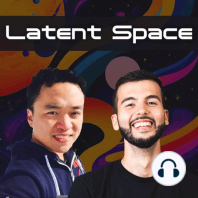51 min listen

No Moat: Closed AI gets its Open Source wakeup call — ft. Simon Willison
No Moat: Closed AI gets its Open Source wakeup call — ft. Simon Willison
ratings:
Length:
44 minutes
Released:
May 5, 2023
Format:
Podcast episode
Description
It’s now almost 6 months since Google declared Code Red, and the results — Jeff Dean’s recap of 2022 achievements and a mass exodus of the top research talent that contributed to it in January, Bard’s rushed launch in Feb, a slick video showing Google Workspace AI features and confusing doubly linked blogposts about PaLM API in March, and merging Google Brain and DeepMind in April — have not been inspiring. Google’s internal panic is in full display now with the surfacing of a well written memo, written by software engineer Luke Sernau written in early April, revealing internal distress not seen since Steve Yegge’s infamous Google Platforms Rant. Similar to 2011, the company’s response to an external challenge has been to mobilize the entire company to go all-in on a (from the outside) vague vision.Google’s misfortunes are well understood by now, but the last paragraph of the memo: “We have no moat, and neither does OpenAI”, was a banger of a mic drop.Combine this with news this morning that OpenAI lost $540m last year and will need as much as $100b more funding (after the complex $10b Microsoft deal in Jan), and the memo’s assertion that both Google and OpenAI have “no moat” against the mighty open source horde have gained some credibility in the past 24 hours.Many are criticising this memo privately:* A CEO commented to me yesterday that Luke Sernau does not seem to work in AI related parts of Google and “software engineers don’t understand moats”. * Emad Mostaque, himself a perma-champion of open source and open models, has repeatedly stated that “Closed models will always outperform open models” because closed models can just wrap open ones.* Emad has also commented on the moats he does see: “Unique usage data, Unique content, Unique talent, Unique product, Unique business model”, most of which Google does have, and OpenAI less so (though it is winning on the talent front)* Sam Altman famously said that “very few to no one is Silicon Valley has a moat - not even Facebook” (implying that moats don’t actually matter, and you should spend your time thinking about more important things)* It is not actually clear what race the memo thinks Google and OpenAI are in vs Open Source. Neither are particularly concerned about running models locally on phones, and they are perfectly happy to let “a crazy European alpha male” run the last mile for them while they build actually monetizable cloud infrastructure.However moats are of intense interest by everybody keen on productized AI, cropping up in every Harvey, Jasper, and general AI startup vs incumbent debate. It is also interesting to take the memo at face value and discuss the searing hot pace of AI progress in open source. We hosted this discussion yesterday with Simon Willison, who apart from being an incredible communicator also wrote a great recap of the No Moat memo. 2,800 have now tuned in on Twitter Spaces, but we have taken the audio and cleaned it up here. Enjoy!Timestamps* [00:00:00] Introducing the Google Memo* [00:02:48] Open Source > Closed?* [00:05:51] Running Models On Device* [00:07:52] LoRA part 1* [00:08:42] On Moats - Size, Data* [00:11:34] Open Source Models are Comparable on Data* [00:13:04] Stackable LoRA* [00:19:44] The Need for Special Purpose Optimized Models* [00:21:12] Modular - Mojo from Chris Lattner* [00:23:33] The Promise of Language Supersets* [00:28:44] Google AI Strategy* [00:29:58] Zuck Releasing LLaMA* [00:30:42] Google Origin Confirmed* [00:30:57] Google's existential threat* [00:32:24] Non-Fiction AI Safety ("y-risk")* [00:35:17] Prompt Injection* [00:36:00] Google vs OpenAI* [00:41:04] Personal plugs: Simon and TravisTranscripts[00:00:00] Introducing the Google Memo[00:00:00] Simon Willison: So, yeah, this is a document, which Kate, which I first saw at three o'clock this morning, I think. It claims to be leaked from Google. There's good reasons to believe it is leaked from Google, and to be honest, if it's not, it doesn't actually matter beca
Released:
May 5, 2023
Format:
Podcast episode
Titles in the series (67)
97% Cheaper, Faster, Better, Correct AI — with Varun Mohan of Codeium by Latent Space: The AI Engineer Podcast — Practitioners talking LLMs, CodeGen, Agents, Multimodality, AI UX, GPU Infra and all things Software 3.0